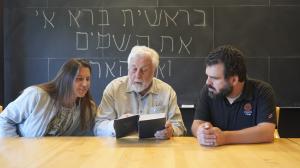St. John's Integrates Jewish & Islamic Classics in its new Master’s Program
College launches one-year, in-person graduate program exploring the foundational texts of Jewish and Islamic civilization
While these two traditions have often been portrayed as being in tension, MAMEC will provide students a singular opportunity to immerse themselves in the original Jewish and Islamic texts, far from the rhetoric of the last 150 years of Middle Eastern politics. Together, faculty and students will learn through the close reading of original texts and respectful discussion what philosophers such as Maimonides, Rumi, ‘Ibn al-‘Arabī, and Judah Halevi thought and wrote. Students will read English translations of great works from both traditions, while also having the choice between studying classical Arabic or Hebrew.
David Carl, associate dean of the graduate programs, says. “By giving these texts their rightful place alongside the classics of ancient Greece and modern Europe, St. John’s continues our essential and ongoing work of revisiting and revising the Western canon in light of its fuller, richer intellectual inheritance.”
Faculty on the college’s Santa Fe, New Mexico, campus spent more than 15 years studying and developing the new program. Ahmed Siddiqi, a former faculty member and ongoing curricular advisor to the program, addresses the tendency to overlook centuries of human thought: “It’s very common to go from an author like Augustine, who died in the fifth century, to authors like Anselm and Thomas Aquinas who died in the 12th and 13th centuries. One of the things we attempt through this program is to close that seven-century gap in scholarship.”
MAMEC is rooted in St. John’s almost 100-year tradition of reading primary texts in small, conversation-driven settings. Its curriculum includes the Hebrew Bible, Islamic philosophy, classical and medieval Jewish and Muslim thought, Persian poetry, and mysticism. Students also study language, and choose Hebrew or Arabic, allowing for more direct access to the original texts.
The new master’s program was established thanks to the generosity of the college’s donors and alumni. It was made possible through a $1 million anonymous matching grant, met by lead gifts from Santa Fe residents Pamela Saunders-Albin and Richard and Cheryl Groenendyke.
“In this program, students don’t just encounter two religious or intellectual traditions—they encounter one another,” says College President J. Walter Sterling. “Through slow reading, shared inquiry, and serious conversation, they begin to see the common questions at the heart of both traditions—and, perhaps, the shared humanity at the heart of all education. At a time when polarization is often presumed, the seminar table remains a place where differences can be explored without division.”
Saunders-Albin, an honorary alumna of the college and Vice Chair of the college’s Board of Visitors and Governors, shares: “The launch of the Middle Eastern Classics program couldn’t be more timely. Once again, St. John’s lives up to its reputation of being the most contrarian college in America by offering a study of ancient wisdom without the modern noise of secondary sources.”
Applications for Fall 2026 open in September. For more information, visit sjc.edu/mamec.
ABOUT ST. JOHN’S COLLEGE
In an age of political division and digital distraction, St. John’s College offers the education America needs. Through close reading of 200 great books across 3,000 years—from Plato to Toni Morrison, Augustine to Charles Darwin, Euclid to Albert Einstein—students wrestle with the deepest questions of law, justice, freedom, and human good. At a time when many institutions chase trends, St. John’s returns to first principles. The third-oldest college in America, with campuses in Santa Fe, New Mexico, and Annapolis, Maryland, St. John’s is a refuge for civic renewal, civil discourse, and intellectual courage. Learn more about our undergraduate, graduate, and lifelong learning programs at www.sjc.edu.
“St. John’s is a high-achieving angel hovering over the landscape of American higher education” —Los Angeles Times
Carol Carpenter, VP Communications
St. John's College
+1 323-459-4661
carol.carpenter|sjc.edu| |carol.carpenter|sjc.edu
Legal Disclaimer:
EIN Presswire provides this news content "as is" without warranty of any kind. We do not accept any responsibility or liability for the accuracy, content, images, videos, licenses, completeness, legality, or reliability of the information contained in this article. If you have any complaints or copyright issues related to this article, kindly contact the author above.
New portrait series on KINOFANS.COM: Hollywood stars in focus
Whimsky Works Skincare Patrol Launches Bold Story of Health, Hope, and Heroism
Crucial Data Solutions Names Dr. Leigh J. Mack Chief Medical Officer Amid Industry AI Shift
Kalendarium
Więcej ważnych informacji
 Jedynka Newserii
Jedynka Newserii

 Jedynka Newserii
Jedynka Newserii

Handel

Ważą się losy wymiany handlowej między Stanami Zjednoczonymi a Unią Europejską. Na wysokich cłach stracą obie strony
Komisja Europejska przedstawiła w poniedziałek propozycję ceł na import z USA o wartości 72 mld euro, co ma być odpowiedzią na nałożenie 30-proc. stawek na import z UE zapowiedziane przez Amerykanów w poprzednim tygodniu. Przedstawiciele KE wciąż widzą jednak potencjał kontynuowania negocjacji. Zdaniem europosła Michała Koboski brak porozumienia lub uzgodnienie stawek wyższych niż 10-proc. nie tylko zaszkodzi obydwu stronom, ale i osłabi ich pozycję na arenie międzynarodowej.
Handel
Nie tylko konsumenci starają się kupować bardziej odpowiedzialne. Część firm już stawia na to mocny nacisk

Kwestie równoważonych zakupów stają się elementem strategii ESG. Dostawy energii, zamówienia surowców i materiałów do produkcji czy elementów wyposażenia biur – na każdym etapie swoich zakupów firmy mogą dziś decydować między opcjami bardziej i mniej zrównoważonymi. Dotyczy to także zamówień rzeczy codziennego użytku dla pracowników czy środków czystości – wskazują eksperci Lyreco, e-sklepu, który prowadzi sprzedaż produktów do biur, pokazując ich wpływ na środowisko czy efektywność pracy.
Prawo
Unia Europejska wzmacnia ochronę najmłodszych. Parlament Europejski chce, by test praw dziecka był nowym standardem w legislacji

Parlament Europejski chciałby tzw. testu praw dziecka dla każdego aktu prawnego wychodzącego z Komisji Europejskiej. – Każda nowa legislacja Unii Europejskiej powinna być sprawdzana pod kątem wpływu na prawa dziecka – zapowiada Ewa Kopacz, wiceprzewodnicząca PE. Jak podkreśla, głos dzieci jest coraz lepiej słyszalny w UE i jej różnych politykach. Same dzieci wskazują na ważne dla siebie kwestie, którymi UE powinna się zajmować. Wśród nich są wyzwania w obszarze cyfrowym i edukacyjnym.
Partner serwisu
Szkolenia

Akademia Newserii
Akademia Newserii to projekt, w ramach którego najlepsi polscy dziennikarze biznesowi, giełdowi oraz lifestylowi, a także szkoleniowcy z wieloletnim doświadczeniem dzielą się swoją wiedzą nt. pracy z mediami.








.gif)

 |
| |
| |
|